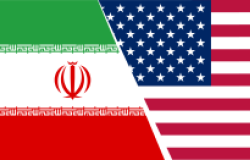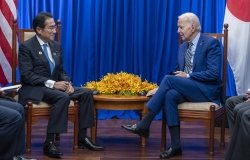Tensions in the Gulf: Implications for U.S. Policy
Join us by phone to hear a group of experts discuss recent events around the Persian Gulf, including the decision by Saudi Arabia and other key Gulf states to isolate Qatar and the first major ISIS attack in Iran, and what this will all mean for U.S. foreign policy in the strategically vital region.
Overview
The dramatic decision by Saudi Arabia, key Gulf states, and others to isolate Qatar is part of a deeper problem that has been brewing for years. How big a challenge does this recent turn of events, including the first major ISIS attack in Iran, portend for U.S. policy and interests in the region? Is this just a headline or does it represent a significant trend line that could reshape Arab politics and power balances?
In this ground truth briefing, three veteran analysts and practitioners of U.S. policy in the Gulf and the region share their views on these and other matters.
Key Quotes:
Aaron David Miller:
“Mr. Trump has three goals in the Middle East: destroying the Islamic state, rolling back Iran, and delivering Israeli-Palestinian peace.”
David Ottoway:
“What are the implications for the United States? If things continue to go the way they are, it really puts us in a tremendous bind...To have Qatar surrounded by ‘enemies'... puts us in a very difficult position. I’m worried because this conflict seems to be getting more tense and not being resolved this time [in] the way it was three years ago, when a similar type of crisis developed between Qatar and its neighbors.”
“While [Saudi Arabia is] far from perfect, when you compare them to our other ‘baskets’ out there, they’re probably about the best we’re going to find to carry on the wars against Islamic extremism and contain, if not roll back, Iran.”
“There’s a lot of potential for some kind of deliberate or accidental conflict involving the Iranians and the Americans in the Bab-el-Mandeb Strait.”
Bruce Riedel:
“Qatar... has been a gadfly, an irritant for the Saudis for some 25 years. [King] Salman’s predecessors learned to live with that gadfly, and to still welcome it into the GCC tent, even as they often spoke quite bitterly and harshly about them in private. Salman’s taking it out of the background. He’s much more willing to take risks and he’s embarked upon quite a belligerent and aggressive approach now.”
“President Trump went to Saudi Arabia, and in an elaborate fashion, he painted the Middle East in very stark terms -- black and white... And the Saudis are the leader in Trump’s dialogue -- the grand coalition which is now going to stamp out terrorism... Unfortunately, the Middle East is not a black and white environment."
“If there is a complete breakdown of harmony within the Gulf Cooperation Council, American interests will suffer.”
“By putting all our eggs in the Saudi basket, in such an unambiguous and black-and-white way, I think the president may be asking more of the Saudis than they can deliver, and also associating himself with a country which, while it’s important in the Islamic world, is not always the most-liked country in the Arab world.”
“I think the president made a mistake in Riyadh in being so unequivocally pro-Saudi. And I think it’s a mistake that is going to come back and haunt this administration.”
Hon. Marcelle Wahba:
“I think now it’s basically 'do this, or regime change or expulsion from the GCC,' [and] clearly, this time is very different. It may be all the same issues and all the same tensions that have been bubbling all along, but a very different message.”
“[The Gulf states] certainly want to see a change in behavior. Whether that requires regime change or not, I think we’re going to see in the end that it will be resolved with a big change in Qatar.”
“I don’t see Saudi Arabia as being a plus for us as we try to push back on Iran. I see it becoming more of a problem than a support for our position in the region."
Speakers

David Ottaway
Former Washington Post Middle East Correspondent
Bruce Riedel
The Honorable Marcelle Wahba
Moderator
Hosted By

Middle East Program
The Wilson Center’s Middle East Program serves as a crucial resource for the policymaking community and beyond, providing analyses and research that helps inform US foreign policymaking, stimulates public debate, and expands knowledge about issues in the wider Middle East and North Africa (MENA) region. Read more
Thank you for your interest in this event. Please send any feedback or questions to our Events staff.










